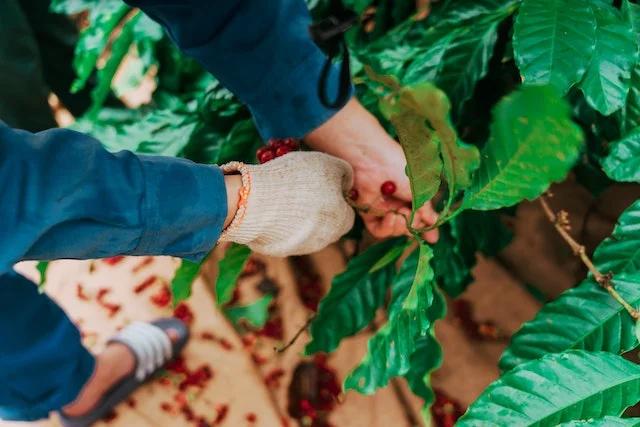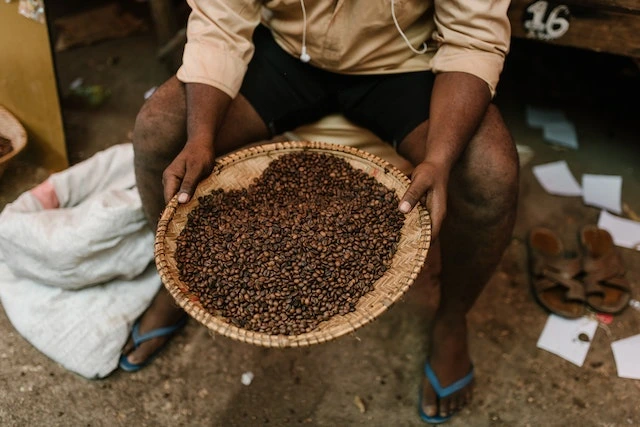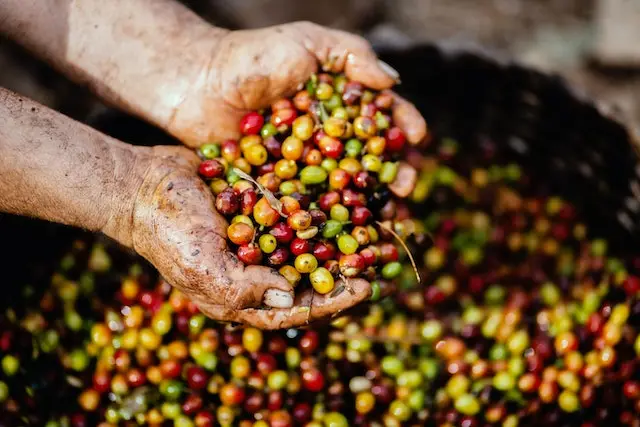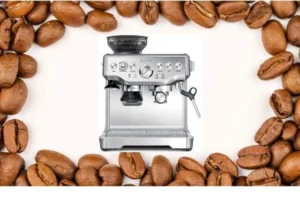Certifications and Labels: A Guide to Eco-Friendly Coffee
Coffee is one of the most widely consumed beverages globally, with over 500 billion cups drunk per year. However, there is a growing awareness of these challenges, and consumers are increasingly looking for ways to make their coffee consumption more sustainable. One effective way to do this is by seeking out Eco-Friendly Coffee Certifications when purchasing your beans. These certifications offer a solution to the sustainability issues associated with coffee production—deforestation, heavy chemical use, soil degradation, biodiversity loss, and unfair labor practices.
| Problem | Impact |
| Deforestation | Habitat and biodiversity loss |
| Intensive water use | Strains local water supplies |
| Pesticides and fertilizers | Pollution and health risks |
| Soil degradation | Loss of fertility over time |
| Unfair labor practices | Poverty and exploitation |
In response, eco-friendly coffee certifications have emerged as a tool for more responsible, ethical sourcing. Third-party verified labels aim to address the social and environmental impacts of coffee production through credible standards related to farming methods, labor rights, and supply chain transparency.
This guide will provide a deep dive into leading certifications like Fair Trade, Rainforest Alliance, and Smithsonian Bird Friendly. You’ll learn the key criteria they enforce and what exactly each label signifies. Understanding certifications enables conscious consumers to vote with their dollars by supporting reputable standards that drive continuous improvement industry-wide.

The Troubling Truth Behind Your Morning Brew
Coffee occupies a unique position as one of the world’s most popular commodities, yet also one of its most chemically dependent crops. Here’s an overview of the main sustainability pain points:
- Water Usage: It can take up to 140 liters of water to produce just 1 kg of coffee. With coffee grown across drier equatorial regions already threatened by climate change, the water-intensive production puts further strain on local water resources.
- Deforestation: Vast swathes of forests across Latin America, Africa, and Asia have been cleared for coffee plantations. This destroys vital habitats for birds, pollinators, and other wildlife. Canopy cover and biodiversity continue declining.
- Pesticides & Fertilizers: Synthetic pesticides and fertilizers are heavily used in conventional coffee farming, with application rates exceeding most other crops. These agrochemicals endanger local ecology and human health through water and soil contamination.
- Soil Degradation: Common practices like monocropping, overuse of chemicals, and removal of shade cover deplete soils of essential nutrients, organic matter, and microbial life over successive harvests. This creates long-term damage.
- Unfair Labor Practices: On large plantations, migrant laborers often work long days under dangerous conditions while being paid far below a living wage. Child labor also remains prevalent in some coffee-growing regions.
In light of these concerns, conscientious consumers are increasingly seeking third-party verified assurances that their coffee meets higher standards for environmental stewardship and social justice.
What Do “Eco-Friendly” Labels Signify?
Several respected certifications have emerged as the foremost standards for sustainable coffee production and ethical sourcing:

Rainforest Alliance Certified
To earn Rainforest Alliance certification, farms must meet criteria focused on:
- Conserving Forests: Protecting existing forests, restoring native tree cover, and reducing encroachment from coffee farming. This maintains vital habitats and ecological services.
- Safeguarding Waterways: Proper use of agrochemicals and wastewater to prevent contamination of local rivers and streams. Comprehensive water management.
- Building Soil Health: Monitoring soil nutrients, organic matter, and erosion. Using cover crops, mulching, and organic fertilization to enrich soils.
- Preserving Biodiversity: Promoting wildlife corridors, buffer zones, and shade canopy. Avoiding destruction of native ecosystems for coffee expansion.
- Ensuring Safe & Fair Labor: Providing living wages, adequate housing, and premiums. Prohibiting child/forced labor. Respecting freedom to unionize.
- Upholding Standards: Annual farm audits to verify compliance. Criteria continuously updated to improve standards over time.
The iconic green frog seal signals that coffee met comprehensive benchmarks encompassing both environmental and social sustainability.
Smithsonian Bird Friendly
Intersecting high-quality organic management with preserving biodiversity, the Bird Friendly seal verifies:
- Organic Methods: Using natural inputs to nourish soils and control pests without any synthetic chemicals, GMOs, or intensive sun coffee.
- Shade Cover: Maintaining minimum canopy cover and tree height diversity to provide suitable habitat for migratory birds.
- Biodiversity Monitoring: Tracking bird species and populations to assess habitat health and guide further improvements.
- Commitment to Conservation: Preserving shade coffee regions that act as essential wintering grounds for threatened migratory birds.
The seal indicates that in addition to USDA Organic standards, farms went further to provide bird-friendly agroforestry environments.
USDA Organic
America’s national organic standards enforced by the USDA focus on:
- Eliminating Synthetic Chemicals: Crops must be grown without synthetic pesticides, fertilizers, herbicides, GMOs or irradiation. A 3-year transition period is required.
- Building Soil Fertility: Using compost, manure, cover crops and other natural techniques to increase microbial activity, nutrients, and water retention in soils.
- Promoting Biodiversity: Intercropping and natural pest control enhance on-farm diversity and ecosystem health. Buffer zones are used to protect native species.
- Preventing Contamination: Steps must be taken to prevent contact with synthetic runoff, genetically modified crops, and prohibited substances. Detailed records kept.
While USDA Organic does not address social issues, it aims to eliminate synthetic inputs to protect long-term ecological health.
Fair Trade Certified
Unique in its mission, Fair Trade certification centers on:
- Fair Prices for Farmers: Farmers are guaranteed minimum price floors, protecting them from market volatility. This enables sustainable practices despite low coffee prices.
- Community Development Funds: Farmers earn an additional premium that is democratically invested in local public goods like education, healthcare, or infrastructure.
- Financial Empowerment: Direct trade relationships between farmer co-ops and buyers cuts out middlemen exploitation. Farmers access credit and obtain skills training.
- Safe Conditions & Labor Rights: Standards for reasonable work hours, workplace safety, living wages, and freedom to organize. Prohibition of child and forced labor.
Fair Trade uses certification to empower small-scale farmers and promote financial sustainability.
Why Certified Coffees Matter
While no certification is perfect, credible third-party programs offer the best assurances currently available that coffee meets verified benchmarks for mitigating environmental and/or social impacts. Here are the key reasons that conscientious consumers seek out certified coffees:
- Preserving Nature: Choosing Rainforest Alliance and Bird Friendly coffee supports biodiversity, soil health, clean water, and carbon storage from conserved forests.
- People Power: Fair Trade and enforced labor rights ensure farmers and workers get treated fairly and paid decent living wages.
- Continuous Improvement: Regular audits and inspections on certified farms motivate setting and meeting higher expectations over time.
- Aligning Values: Purchasing certified coffee enables you to act act on your principles related to ecological health, wildlife, community empowerment and justice.
- Reducing Chemicals: Organic standards prohibit synthetic pesticides and fertilizers that harm local ecology, wildlife, and farm workers.
- Climate Impact: Sustainable farming practices like agroforestry and organic can lower coffee’s carbon footprint versus intensive monocropping.
- Quality: The extra care and responsibility involved with meeting certifications translates into superior coffee taste and aromas.
Where To Buy Sustainable Beans
When scanning the coffee aisle or browsing online, look for certification seals from reputable organizations:
Many leading coffee companies like Starbucks, Peet’s Coffee, or Caribou Coffee now offer certified blends carrying seals like Fair Trade, Rainforest Alliance, or USDA Organic. Additionally, small-batch specialty roasters focused on sustainability often have direct relationships with certified farms.
Check roaster websites and product details to verify which certifications their coffee lines support. Reach out to customer service with any questions—transparency is essential.
You can make a measurable impact by choosing certified coffees that align with your personal values and priorities around issues like human rights, wildlife conservation, agrochemical reduction, and beyond.

| Certification | Key Focus | Standards |
| Rainforest Alliance | Environmental sustainability | Forest, soil, water conservation. Wildlife protection. |
| Smithsonian Bird Friendly | Organic shade-grown coffee | Meeting organic standards. Maintaining biodiversity for birds. |
| USDA Organic | Eliminating synthetic chemicals | No pesticides, fertilizers, GMOs or irradiation. |
| Fair Trade | Empowering small-scale farmers | Fair pricing. Investment in community development. |
Conclusion
The next time you’re shopping for coffee, whether for your morning brew at home or an afternoon pick-me-up, seek out beans carrying certifications like Fair Trade, Organic, or Rainforest Alliance. While imperfect, these labels offer the clearest assurance currently that your coffee was produced in a manner aligning with values like environmental sustainability, wildlife conservation, fair labor practices, and social justice.
By choosing certified coffees, consumers can collectively drive the industry towards more responsible farming and sourcing standards that better protect the planet and its people. Through our daily coffee habit, we all have power to vote with our dollars and motivate continuous advancements in ethics and ecology. With so many great coffee options meeting higher benchmarks now available, there’s no need to compromise quality or conscience.
So next time you restock your home stash or grab your go-to latte order, go certified. Look for the seals and know your coffee is part of the solution. Together through our purchases, we can help shade the future of coffee in a little more green.








